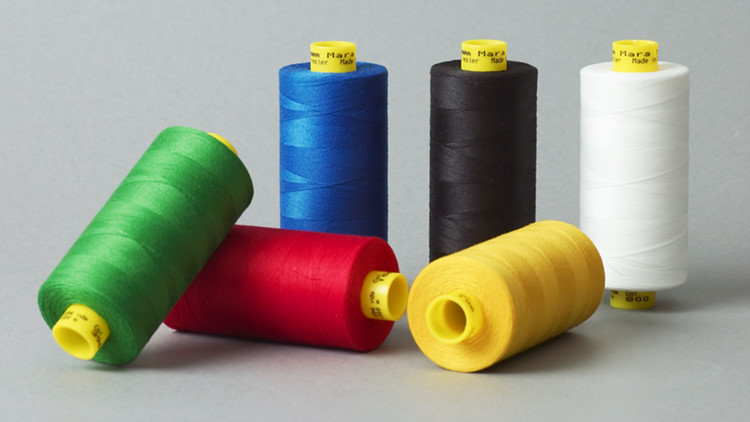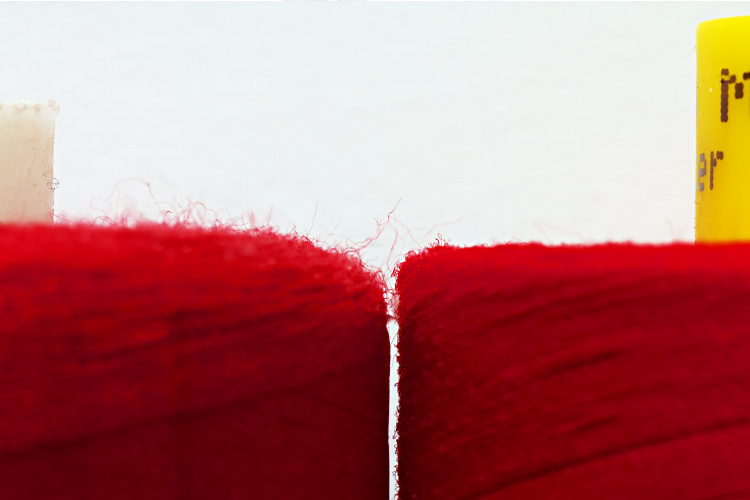Gütermann Mara 120 1000m

| Areas of use: | |
|---|---|
| Regular seams: | |
| Top stitching: | |
| Thick fabrics: | |
| Light fabrics: | |
| Overlock: | |
| Coverstitch: | |
| Machine embroidery: | |
| Technical specifications: | |
|---|---|
| Material: | Polyester |
| Breaking strength: | 1172 g |
| Elongation: | 15% (min) ~ 20% (max) |
| Tkt: | 120 |
| dtex: | 250 |
| Rec. needle size: | NM 70 ~ 80 |
| Dimensions: | 75mm x 30mm |
| Weight (inc spool): | 29g |
Universal thread in normal thickness for childen's wear, tops, shirts, dresses, skirts and almost anything.
Normal spool - fits most domestic sewing machines.
This is the sewing thread for the really demanding sewers.
Developed and produced by Gütermann, whom the name itself is a mark of quality.
Mara looks and feels differently than other threads. This thread is unusually even and is practically free of loose fibres and lint.
You can actually see the difference with the bare eyes.
Below is a closeup of Mara compared to cheap sewing thread.
The visual difference between Mara and other quality threads (like Epic) is not as obvious, but still noticeable.

Since this thread is exceptionally even it's also very suitable for machine embroidery. Especially if you don't like the shine of regular embroidery threads, then Mara is an excellent alternative. In addition to making matte embroideries the result would also be more durable since polyester is stronger than rayon. And the best of all: you can use the same threads for both seam and embroidery! If you plan to embroider a lot then you may want to consider a thicker thread, for instance Mara 70 since it will give a better fill.
Many coverstitch machines really likes this thread. Several of my customers who had problems with their coverstitch machines has reported their machines start running like a clock once they changed their threads to Mara. Apparently only a few coverstitch machines are this picky on threads. I haven't heard about regular sewing machines or overlock being this picky.
 What makes Mara so special is a technique Gütermann named "MCT" (Micro Core Technology).
This is a unique manufacturing process which builds the threads of micro filaments instead of fibres.
What makes Mara so special is a technique Gütermann named "MCT" (Micro Core Technology).
This is a unique manufacturing process which builds the threads of micro filaments instead of fibres.
OK hang on a bit, what the heck are filaments and fibres?
Fibres are relatively short "straws" or "hair". Filaments are bluntly speaking "fibres" which are very, very long (or neverending).
Fishing lines or nylon threads are well knows examples of filaments.
The reason why sewing threads normally are made of short fibres is because it gives better friction.
Without friction a sewing thread would have difficulty serving it's purpose; namely keeping fabrics together.
If you ever sewn with nylon threads (for instance invisible threads) you probably notices how easily the thread loosen, despite you making a knot and everything. This is because filaments are more slippery than fibres and hence not suitable for normal sewing threads. There are however many specialized threads made of filaments, but they're not meant for regular stitching.
With MCT has Gütermann used micro filaments, or tiny, tiny filaments, and spun them together to form sewing threads. Because these filaments are so small and so many they create more friction than other filament threads. Gütermann has in this way brilliantly combined the best of two worlds. The result is the most even and uniform sewing thread available and at the same time keep the desirable properties of traditional sewing threads.
(The technology is actually a bit more complicated. This is merely explained in non-complicated way).
MCT logo from www.gutermann.com
 TikTok
TikTok YouTube
YouTube